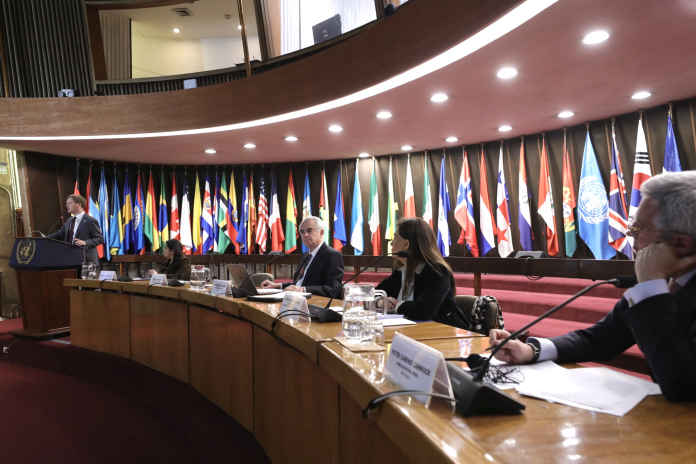 SANTIAGO DE CHILE – The United Nations and the multilateral system are essential tools for building bridges, addressing complex global challenges and harnessing emerging opportunities, authorities said today at a high-level event held at the main headquarters of the Economic Commission for Latin America and the Caribbean (ECLAC) in Santiago, Chile, which featured the participation of Norway’s minister ofiInternational development, Åsmund Aukrust, as the main speaker.
SANTIAGO DE CHILE – The United Nations and the multilateral system are essential tools for building bridges, addressing complex global challenges and harnessing emerging opportunities, authorities said today at a high-level event held at the main headquarters of the Economic Commission for Latin America and the Caribbean (ECLAC) in Santiago, Chile, which featured the participation of Norway’s minister ofiInternational development, Åsmund Aukrust, as the main speaker.
“Multilateralism and the United Nations have been a tremendous success for the last 80 years. We have lived through the most peaceful 80 years of human history. We have experienced the strongest economic development. We have created a large number of international laws that are the pillar of all these achievements. In other words, multilateral cooperation has completely changed the world, and it has benefited all of us,” minister Åsmund Aukrust declared during a presentation made in the context of the high-level panel Multilateralism and Reforms: Building Bridges, Sustaining Impact and Protecting Rights.
In his remarks, the Norwegian official defended the value of the United Nations and expressed his country’s commitment to the reform process being carried out by the organization. “The United Nations are us, the member states. In the end, we have to take responsibility,” he affirmed.
He also stressed the importance of continuing to further implementation of the 2030 Agenda for Sustainable Development and the Pact for the Future, and of defending principles such as gender equality and the rights of all minorities.
Minister Åsmund Aukrust was received at ECLAC by executive secretary José Manuel Salazar-Xirinachs, who highlighted Norway’s role in the multilateral system.
“Norway has always been a beacon of the United Nations system. From the first secretary general, Trygve Halvdan Lie, to its sustained leadership in defense of multilateralism and the three pillars of the UN charter: human rights, peace and security, and sustainable development. This is why we welcome you not as a visitor but as a friend and fellow traveller,” ECLAC’s highest authority stated.
He added that for Latin America and the Caribbean, “Norway does not feel far away,” and noted that 2025 marks the 10th anniversary of that country’s incorporation into ECLAC as a member state.
The lecture by Åsmund Aukrust featured comments by Gloria de la Fuente González, undersecretary of foreign affairs of Chile; Peter Camino Cannock, the Peruvian ambassador to Chile; Laura Moreno Rodríguez, the Mexican ambassador to Chile; and José Manuel Salazar-Xirinachs, ECLAC’s executive secretary.
In her remarks, undersecretary Gloria de la Fuente emphasised that Chile and Norway share a foreign policy vision based on defending democracy, human rights and multilateralism, and she pointed up ECLAC’s efforts to provide both political and academic spaces for strengthening the region’s multilateral tools.
Ambassador Peter Camino flagged an accelerated erosion of the international order, and urged for consolidating a clear perspective that would recognize the magnitude of the challenges facing the region, and a renewed commitment to the principles that have guided international cooperation at the best of times: dialogue, inclusion, solidarity and mutual respect.
Ambassador Laura Moreno, meanwhile, emphasised that from Mexico’s viewpoint, multilateralism is the proper tool for building bridges and addressing global challenges in a timely and effective way. She stressed that the United Nations continues to be the international community’s best tool for tackling global challenges.
In his remarks, ECLAC’s executive secretary said that we are confronted with a world marked by multiple tensions and ruptures, and he warned that for Latin America and the Caribbean, the scenario includes weak economic growth, the deepening of social inequalities and a questioned international system.
He added that the region enters this new international context with high levels of political fragmentation, noting that ECLAC has been advocating for a pragmatic and realistic approach, based on minimal agreements and on building agendas that could align interests.
“Overcoming this fragmentation is especially important for our participation in the global arena,” he stated.
Finally, the senior United Nations official called on the region’s countries and societies to face this complex international scenario based on their capacities, and not just on their fears.
“The United Nations is an imperfect system, a work in progress that is under constant construction. It is a system that needs reform, as the secretary general has recognized in the framework of the UN80 Initiative. But it is also a system that deserves our most ardent defense,” he concluded.
Prior to the lecture, Norway’s minister of international development, Åsmund Aukrust, and ECLAC’s executive secretary, José Manuel Salazar-Xirinachs, held a bilateral meeting in which they addressed strengthening historical ties between the two parties.





